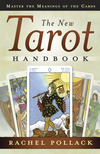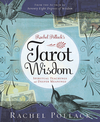Tools to Grow

"If I have seen a little further it is by standing on the shoulders of giants."
~Isaac Newton
For many of us, myself included, Rachel Pollack and her work were our entries into the mysteries and secrets and delights of tarot. She is like a fairy godmother and her work, blessings and gifts.
Her most recent work, The New Tarot Handbook, is another beautiful gift to us and it is also, for her, an homage to the woman she considers the Mother of Modern Tarot: Eden Gray. Some of us may not be familiar with Gray's work or may write them off as "cookbooks" (some people call books of card interpretations "cookbooks" and attach a derogatory meaning to it, although I'm not sure why). What makes Gray worthy of the title Mother of Modern Tarot?
Rachel studied card interpretations through history in order to see how the interpretations evolved over time. In her analysis, Rachel noticed something strange. She writes, "Some of the modern meanings most writers took for granted did not appear in the older commentaries, not even A. E. Waite…. So where did they come from? Finally I realized—Eden Gray. I also might mention that Gray was the person who first described the tarot as 'the Fool's journey'."
Eden Gray's work is short and direct. But tucked within those short entries is so much more, such deeper knowledge and awareness. The cards are often called "keys." Gray does not take you by the hand and guide you though the endless mansions and gardens of tarot, pointing out all the important parts. She is not a tour guide. Instead, she gives you, in a few sentences, a key that you can use to open the door and go through yourself, exploring at will, finding what you may. She encourages self-reliance and a sense of adventure.
As does our beloved Rachel Pollack, for I know of no one more adventurous than her when it comes to exploring tarot. Who else but Rachel would ask the tarot to show her the reading it gave God when he created the world?
 For so many eager tarot lovers, 78 Degrees of Wisdom was our bible. In the several decades since that wonderful book was first published, Rachel has learned and experienced a lot. Imagine what treasures are hidden in the pages of The New Tarot Handbook. She gives us a wealth of knowledge, of course. But she also gives us tools and space to grow, to develop our own relationship with the cards, and to experience our own adventure while exploring the cards.
For so many eager tarot lovers, 78 Degrees of Wisdom was our bible. In the several decades since that wonderful book was first published, Rachel has learned and experienced a lot. Imagine what treasures are hidden in the pages of The New Tarot Handbook. She gives us a wealth of knowledge, of course. But she also gives us tools and space to grow, to develop our own relationship with the cards, and to experience our own adventure while exploring the cards.
For example, one of my favorite features of this book is the spreads: one for each Major Arcana, one for each suit, and one for the court cards. These spreads give hints about the cards; they also open doors for us to learn how the cards relate to our lives and how we think and feel about them.
Like Gray's work, each card includes a short exploration and divinatory meanings for both upright and reversed cards. These entries provide enough information for a novice to do a great reading. They are chock full of so much wisdom that they give a more experienced reader much to think about.
The court cards often give new (and even experienced) readers a bit of trouble. Although this is not a workbook, Rachel describes some of her processes, which you can replicate. In fact, just for fun, and to see what your choices are before being influenced by reading Rachel's theme words for the cards, I suggest you do as she did:
Lay out all of the court cards and pick one or two theme words for each one, focusing on what makes each one unique. For example, passion might not be the best choice for the Knight of Wands because all the Wands courts share the trait of passion. So what makes the Knight unique amongst the other Wands courts? What makes him unique amongst the other Knights? Give it a try.
In addition, you can take inspiration from Rachel's spreads. She created, as mentioned above, spreads for each Major, the four suits, and for the court cards in general. Why not make your own spreads for each of the court cards? Or make one spread, perhaps a kind of "getting to know you" spread, and use it to do a reading for each court card?
This is the thing about great explorers and teachers, like Gray and Rachel. They don't spoon-feed you; they give you a hand up so you can see farther. They give you a strong enough foundation so that you can move ahead on your own unique journey with confidence. That is the beauty, I think, of a smaller book. Rather than overwhelming and inundating, it creates interesting white space in your mind, giving you room to think rather than just ingest information.
Within the pages of this concise handbook, Rachel creates a sacred space with knowledge, understanding, and insight. What you do within this space is entirely up to you. But I guarantee, if you bring just a little curiosity, you'll do amazing things.

About Barbara Moore
Related Products


is subject to certain Terms and Conditions